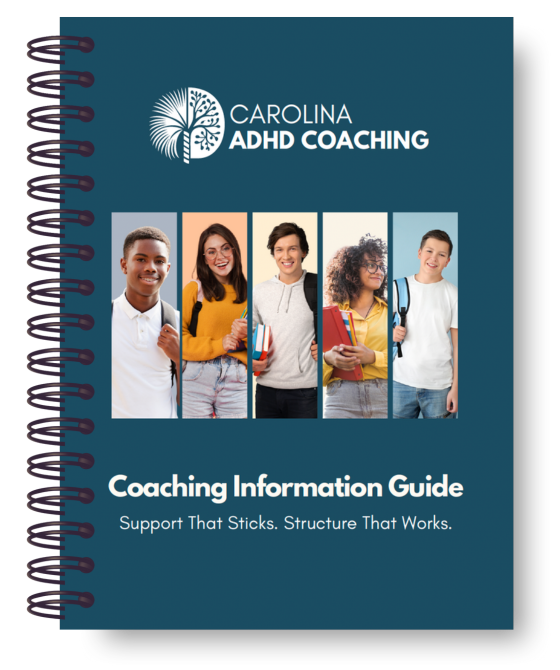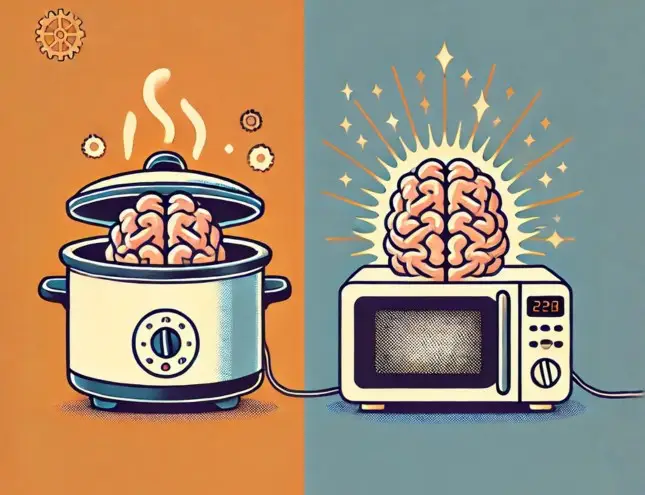Good executive function skills are the foundation for so many parts of life — school, friendships, managing responsibilities, and eventually, navigating work and adulthood.
But what happens when these skills don’t come naturally?
It doesn’t mean a student isn’t smart, motivated, or talented. It simply means their brain is wired to work differently — and they may need a little extra support building the strategies that help everything click into place.

That’s where executive function coaching comes in.
Executive function coaching helps teens and young adults strengthen the skills they need to manage life with more confidence and clarity.
At Carolina ADHD Coaching, we help teens and young adults strengthen the real-world skills they need to thrive — both in and out of the classroom. Our work is practical, supportive, and tailored to each student’s unique strengths and needs.
We put together this post to give parents a closer look at how coaching helps build executive function skills — and what these skills look like in action.

10 Executive Function Skills Coaching Builds
1. Task Initiation
What it impacts: The ability to start tasks independently — without endless stalling, distractions, or needing constant reminders.
Real-world example: Your teen knows they need to start their history paper… but somehow it’s 8PM, they’ve reorganized their desk, watched three YouTube videos, and still haven’t typed a word. Or they say “I’ll start it after dinner” — night after night — and the deadline creeps closer.
How coaching helps: We teach students practical strategies to break through “start paralysis” and build routines that make getting started feel manageable — not overwhelming.
2. Time Management
What it impacts: The ability to estimate time accurately, plan ahead, and balance commitments.
Real-world example: Your student underestimates how long homework will take, thinking they can “knock it out” in 30 minutes — but four hours later, it’s still not done and bedtime is blown. Or they agree to too many activities and end up constantly behind.
How coaching helps: We help teens learn to plan realistic timelines, build buffer time, and create schedules that actually work for their brain and life.
3. Organization
What it impacts: Keeping track of materials, assignments, digital files, and personal space.
Real-world example: The backpack is a black hole. Papers are crumpled at the bottom, missing entirely, or forgotten at home. Or your student spends half their homework time looking for the right materials — or rewriting things they misplaced.
How coaching helps: We guide students in setting up simple, sustainable organization systems — for schoolwork, supplies, digital life, and personal space.
4. Planning and Prioritization
What it impacts: Breaking down tasks into steps, knowing what to do first, and adjusting plans as needed.
Real-world example: Your teen gets assigned a big project — but instead of mapping out a plan, they freeze or only focus on the “fun” parts. The important steps get rushed (or missed), and last-minute panic sets in.
How coaching helps: We teach students how to map out steps, prioritize what matters, and build project timelines that prevent last-minute stress.

5. Working Memory
What it impacts: Holding and using information in the moment — like following multi-step instructions or remembering what to do next.
Real-world example: You remind your teen to “grab your laptop, pack your gym clothes, and put your lunch in your bag” — but they show up with none of it because they got distracted halfway through.
How coaching helps: We help students build memory strategies, external supports, and habits that make multi-step tasks easier to manage.
6. Emotional Regulation
What it impacts: Managing frustration, anxiety, and big feelings — especially during challenging tasks or transitions.
Real-world example: A single tough math problem sends your teen into a spiral: “I’m stupid. I’ll never get this. I give up.” Or small schedule changes trigger outsized stress responses.
How coaching helps: We help students develop tools to manage emotions, build resilience, and recover more quickly when things feel overwhelming.
7. Self-Monitoring and Reflection
What it impacts: Noticing what’s working (or not), adjusting behavior, and learning from experience.
Real-world example: Your student keeps getting low quiz grades but says, “I studied!” — without realizing they need a new approach. Or they think they “worked on homework for two hours,” but a time log shows 45 minutes of actual focus.
How coaching helps: We teach students to reflect honestly on habits and outcomes — so they can make smarter adjustments and grow over time.
8. Flexible Thinking
What it impacts: Adapting to change, trying new strategies, and problem-solving creatively.
Real-world example: The teacher changes the due date or format of an assignment — and your teen melts down or refuses to adapt. Or they get stuck in “all or nothing” thinking: “If I can’t do it perfectly, I won’t do it at all.”
How coaching helps: We help students practice flexibility, curiosity, and resilience — so changes feel manageable instead of catastrophic.
9. Goal Setting
What it impacts: Setting realistic goals, breaking them into steps, and tracking progress.
Real-world example: Your student says they want to “get better grades” — but without clear goals or a plan, nothing changes. Or they aim too high, get discouraged, and give up.
How coaching helps: We help students set clear, achievable goals — and teach them how to track progress and celebrate wins along the way.
10. Self-Advocacy
What it impacts: Knowing when and how to ask for help, accommodations, or clarification.
Real-world example: Your teen struggles in a class but won’t email the teacher or ask for extra help. Or they hide challenges instead of advocating for what they need to succeed.
How coaching helps: We coach students on when and how to speak up — so they feel empowered to access support and take ownership of their learning.

What Parents and Teens Often Notice Through Coaching
We never promise overnight transformations — and every student’s journey is different. But over time, parents and teens often start to notice small shifts in that make a big difference:
✅ Fewer missing or incomplete assignments — and more work getting turned in on time.
✅ Less “stuck” time and more ability to start tasks independently/
✅ A bedroom, backpack, or workspace that’s not perfect, but noticeably more organized.
✅ More realistic planning around homework, projects, and after-school commitments.
✅ A calmer response to challenges, setbacks, or changes in routine.
✅ A growing willingness to ask for help or use strategies they’ve learned.
✅ Increased confidence in handling school — and life — more independently.
Most importantly, you start seeing your teen tap into the potential you’ve always known they had — building habits and skills that set them up for the future.
These are the kinds of changes that build over time — and they can make daily life feel a whole lot more manageable for both students and parents.
Looking to help your teen or young adult build stronger executive function skills?
That’s our expertise.
At Carolina ADHD Coaching, we support students in developing the practical tools, habits, and self-belief they need to navigate school, life, and whatever comes next. Every step forward — no matter how small — helps them build a foundation for greater confidence and independence.

Get an inside look at how our coaching works, what to expect, and how to get started. It’s free — and packed with helpful info for parents and students!
Download the Guide


